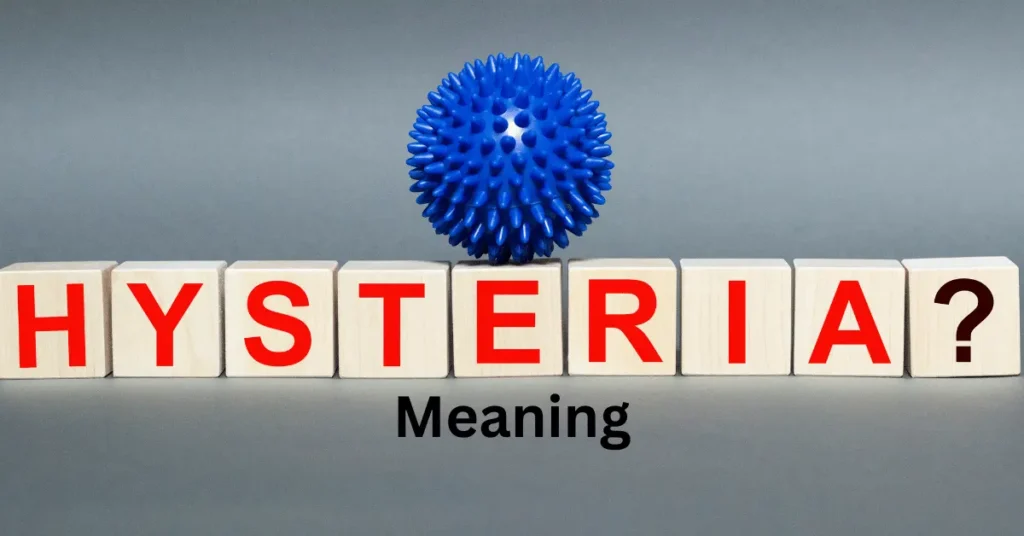Hysteria Meaning

Have you ever heard the term “hysteria” and wondered what it really means? In everyday conversations, we might use the word when describing moments of extreme fear, excitement, or even anger.
But there’s more to the term than just a quick description of intense emotions. The meaning of hysteria goes deeper, and its history is quite fascinating too!
In this blog post, we’ll explore the true meaning of “hysteria,” where it comes from, and how it’s used in today’s world.
Whether you’re curious about its psychological aspects or just want to understand the term better, you’re in the right place! Let’s dive in and learn more about the meaning of hysteria together.
What Does “Hysteria” Mean?
At its core, the term hysteria refers to a state of extreme emotional intensity—whether it’s fear, excitement, anger, or even joy—that a person struggles to control.
It’s often associated with a sense of being overwhelmed, where the emotions feel so powerful that they take over a person’s thoughts and actions.
Historically, hysteria was seen as a physical and psychological condition, mostly linked to women.
But over time, the meaning has broadened, and it’s now often used more casually to describe moments of exaggerated emotion or chaotic reactions in various situations.
When we talk about hysteria today, we usually refer to an out-of-control emotional state where logic and reason take a backseat.
For example, someone might say “the crowd went into hysteria” at a concert, meaning the fans became so excited or overwhelmed by the experience that they lost themselves in the moment.
Importantly, hysteria isn’t just about a temporary outburst of emotion. It can also describe situations where someone is unable to manage their feelings, causing distress or disruption in their daily life.
While the term is often used in everyday language to describe a strong emotional reaction, it’s also important to recognize that extreme hysteria might require professional help, particularly if it’s linked to mental health challenges.
Hysteria Meaning: Definition and Examples
Definition of Hysteria
At its simplest, hysteria refers to an emotional reaction that is intense, uncontrollable, and disproportionate to the situation at hand.
It can encompass a wide range of emotions, including fear, excitement, anger, or panic, and often involves a loss of self-control.
When someone experiences hysteria, their response tends to be so overpowering that it affects their behavior, making it difficult for them to think clearly or act rationally.
In some contexts, the term can be used to describe a group of people who are caught up in a shared emotional state, often leading to a collective sense of chaos or uncontrollable excitement.
While hysteria historically had medical connotations, especially in the 19th century, it’s now more commonly used in everyday language to describe extreme emotional reactions, both individually and within groups.
Examples of Hysteria
Public Events: Imagine a large concert where fans are so excited about seeing their favorite artist that they scream, cry, and even push each other, losing control of their emotions.
This can be described as “hysteria,” as the crowd’s excitement and energy have reached a level that seems almost irrational.
- Panic During an Emergency: In a dangerous situation, such as a fire or natural disaster, some individuals may experience hysteria. Their fear might cause them to act impulsively, running in chaotic directions or even disregarding safety protocols. The intense fear and lack of control can make the situation worse, as the person isn’t able to think clearly in the midst of their emotional response.
- Social Media Frenzy: In the age of social media, you might see instances where a rumor or trending topic creates mass hysteria online. People might share exaggerated claims, spreading panic or excitement to others. For example, during a major celebrity scandal, some fans may react with such heightened emotion that it’s hard to distinguish between genuine concern and a loss of control fueled by the hysteria surrounding the event.
- Historical Examples: Historically, hysteria was often linked to women, especially during the 18th and 19th centuries. For example, during the “Salem Witch Trials,” women were accused of being hysterical due to their outbursts and behavior, which were often misunderstood. At the time, hysteria was incorrectly seen as a medical condition, believed to be caused by a woman’s “wandering womb” or psychological imbalance.
These examples show how hysteria can manifest in both personal and collective situations. Whether it’s an individual losing control of their emotions or a group becoming overwhelmed by collective excitement or fear, hysteria often reflects the inability to manage intense feelings in the moment.
Word Origin of Hysteria

The word “hysteria” has deep roots in the history of language and medicine, stretching back to ancient Greece. Understanding its origin helps explain why the term has carried so many different meanings over time.
The term hysteria comes from the Greek word hystera (ὑστήρᾱ), which means “womb.” In ancient times, hysteria was thought to be a condition specifically related to women’s reproductive organs.
The ancient Greeks believed that emotional or psychological disturbances in women were caused by a “wandering womb.”
According to this theory, if a woman’s uterus moved out of its proper place, it could cause physical and mental symptoms, such as anxiety, fainting, irritability, or emotional outbursts. This theory led to the early association of hysteria with women and their reproductive health.
The idea of hysteria as a “female disorder” persisted well into the 19th century, particularly in the field of medicine.
Doctors of the time would often diagnose women with hysteria for a wide range of symptoms, from unexplained physical pain to intense emotional reactions. Women were sometimes prescribed treatments like rest, isolation, or even “pelvic massages” to release supposed “stagnant energy” in the womb.
In fact, this medical treatment for hysteria became a joke in pop culture and has even inspired the creation of early medical devices, such as the vibrator, intended for the treatment of this supposed condition.
As science progressed, however, the concept of hysteria evolved. By the late 19th century and early 20th century, doctors like Sigmund Freud began to look at hysteria not as a physical condition caused by the womb, but rather as a psychological issue.
Freud explored the relationship between unconscious trauma and emotional breakdowns, linking hysteria to deep-seated psychological conflicts rather than a physical ailment.
This shift marked the beginning of our modern understanding of hysteria as a psychological disorder.
By the 20th century, hysteria had moved away from the medical realm and entered the broader cultural lexicon. Today, the word is commonly used to describe intense emotional reactions in both men and women—ranging from fear to excitement to anger—that can lead to irrational or exaggerated behavior.
FAQs
What causes hysteria?
Hysteria can be triggered by intense emotions, stressful situations, or psychological factors. It may arise from fear, anxiety, excitement, or frustration that becomes overwhelming and difficult to control. In some cases, it might be linked to deeper mental health issues, such as panic disorders or trauma. Additionally, societal pressure or group dynamics can sometimes lead to collective hysteria, where a group of people becomes emotionally overwhelmed by a shared fear or excitement.
Is hysteria the same as a panic attack?
While both hysteria and panic attacks involve intense emotional responses, they are not exactly the same. A panic attack is a sudden onset of intense fear or discomfort, often accompanied by physical symptoms like heart palpitations or shortness of breath. Hysteria, on the other hand, typically refers to a broader range of emotional states, such as fear, excitement, or anger, that can be uncontrollable or exaggerated. While panic attacks are more physiological, hysteria often involves emotional and psychological elements.
Can hysteria be treated?
Yes, hysteria can be treated, especially if it is linked to underlying mental health issues. Treatment often depends on the specific cause of the hysteria. Psychological therapies, such as cognitive behavioral therapy (CBT) or psychotherapy, can help individuals manage emotional responses and reduce feelings of anxiety or fear. In some cases, medication may also be prescribed to address symptoms of anxiety or panic. It’s important to consult a healthcare professional to determine the best course of treatment.
Is hysteria only a problem for women?
Historically, hysteria was considered a condition that mostly affected women, due to misconceptions about female physiology. However, modern understanding recognizes that hysteria (or extreme emotional reactions) can affect both men and women. The medical community no longer associates hysteria with gender, and the term is now used to describe emotional responses in people of all genders.
Can hysteria be prevented?
While hysteria itself may not always be preventable, managing stress and developing emotional coping strategies can reduce the likelihood of extreme emotional reactions. Practicing mindfulness, relaxation techniques, and maintaining a healthy lifestyle can help people manage their emotions more effectively. If someone experiences frequent bouts of hysteria or emotional overwhelm, seeking professional guidance to address underlying psychological issues may also be helpful.
Conclusion
In conclusion, hysteria refers to intense, uncontrollable emotional reactions like fear, excitement, or anger.
While it has a complex history, often misunderstood and linked to gender in the past, we now recognize that it can affect anyone, regardless of gender.
Whether it’s triggered by stress, anxiety, or even a group dynamic, hysteria reflects an overwhelming emotional state that can be hard to control.
If someone experiences frequent emotional overwhelm, seeking professional help is always a good idea.
By understanding what hysteria truly means, we can better manage our emotions and approach the topic with more clarity.
Extra Points on Hysteria
- Hysteria in Pop Culture: The term “hysteria” has appeared in movies, TV shows, and books, often to describe wild or chaotic situations. It’s common to see it used in scenes where people are overly excited or scared, like in thrillers or comedies, even though it may not always be used accurately.
- Gender and Hysteria: Historically, hysteria was seen as a condition primarily affecting women, often linked to their reproductive health. Thankfully, we now know that emotional and psychological challenges aren’t gender-specific, and both men and women can experience intense emotional reactions.
- Group Hysteria: Sometimes, hysteria can spread within groups, turning individual emotional reactions into a collective experience. This is called “mass hysteria” and can occur during public events, emergencies, or even in smaller groups, where everyone becomes caught up in the shared emotions of fear or excitement.
- The Impact of Stress: Chronic stress is one of the common triggers for hysteria. People under constant pressure might be more prone to emotional breakdowns or exaggerated emotional reactions. Managing stress through self-care, therapy, or relaxation techniques can help prevent these overwhelming feelings.
- Changing Views on Hysteria: Modern psychology no longer sees hysteria as a medical condition caused by a “wandering womb” or purely physical factors. Today, it’s understood more as a result of emotional or psychological triggers, and treatment often involves therapy or coping strategies.